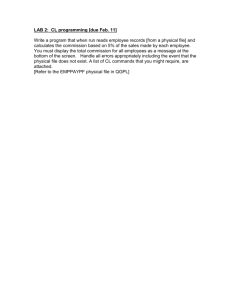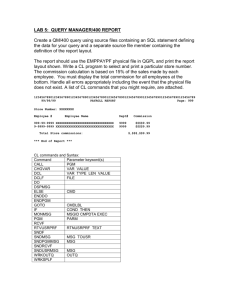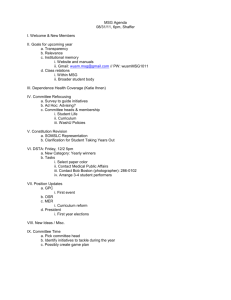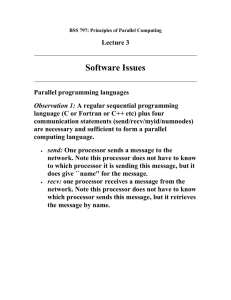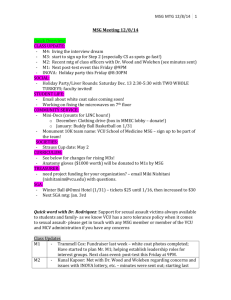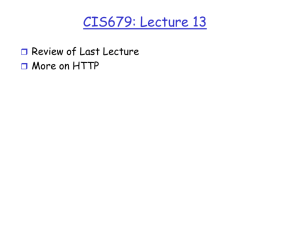UC Desc. Review
advertisement
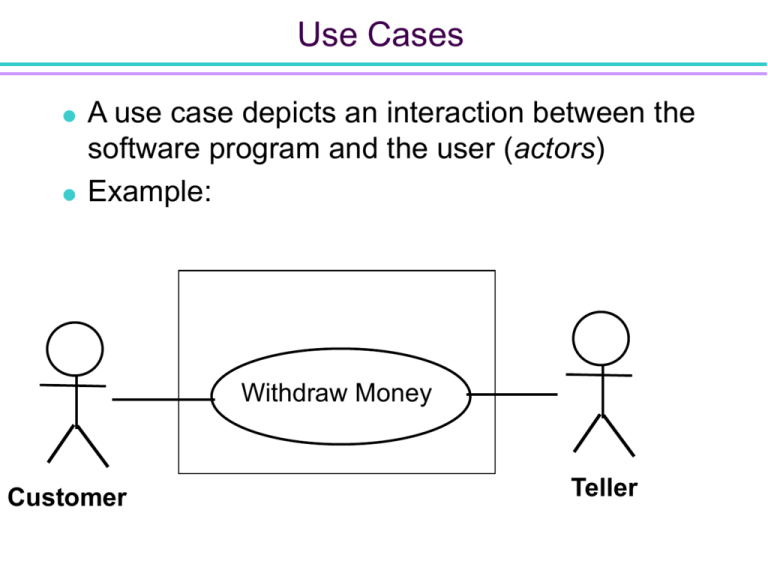
Use Cases A use case depicts an interaction between the software program and the user (actors) Example: Withdraw Money Customer Teller Use Cases (contd) An actor is a external entity outside the software product but interacting with that product It is usually easy to identify an actor An actor is frequently a user of the software product An actor plays a role with regard to the software product. This role is As a user; or As an initiator; or As someone who plays a critical part in the use case A user of the system can play more than one role Example: A customer of the bank may be A Borrower or A Lender Use Cases (contd) While one use case can have multiple actors, One actor can be a participant in multiple use cases Example: A Borrower may be an actor in The Borrow Money use case; The Pay Interest on Loan use case; and The Repay Loan Principal use case Also, the actor Borrower may stand for many thousands of bank customers An actor need not be a human being Example: An e-commerce information system has to interact with the credit card company information system The credit card company information system is an actor from the viewpoint of the e-commerce information system The e-commerce information system is an actor from the viewpoint of the credit card company information system Use Cases (contd) A potential problem when identifying actors Overlapping actors Example: Hospital software product One use case has actor Nurse A different use case has actor Medical Staff Better: Actors: Physician and Nurse Alternatively: Actor Medical Staff with two specializations: Physician and Nurse Medical Staff Physician Nurse The MSG Case Study The Martha Stockton Greengage Foundation (“MSG”) provides low cost mortgage loans to young couples The trustees commission a pilot project A software product to determine how much money is available each week to purchase homes. A mortgage is a loan in which real estate is used as security Example: House costs $100,000 Buyer pays a 10% deposit and borrows the balance The principal (or capital) borrowed is $90,000 Loan is to be repaid monthly over 30 years Interest rate of 7.5% per annum (or 0.625% per month) The MSG Case Study Each month, the borrower pays $629.30 Part of this is the interest on the outstanding balance The rest is used to reduce the principal The monthly payment is therefore often referred to as P & I (principal and interest) In the first month the outstanding balance is $90,000 Monthly interest at 0.625% on $90,000 is $562.50 The remainder of the P & I payment of $629.30, namely $66.80, is used to reduce the principal At the end of the first month, after the first payment has been made, only $89,933.20 is owed to the finance company In the second month the outstanding balance is $89,933.20 Monthly interest at 0.625% on $89,933.20 is $562.08 The remainder of the P & I payment of $629.30, namely $67.22, is used to reduce the principal At the end of the second month, after the second payment has been made, only $89,865.98 is owed to the finance company The MSG Case Study After 15 years (180 months) the outstanding balance is $67,881.61 Monthly interest at 0.625% on $67,881.61 is $424.26 The remainder of the P & I payment of $629.30, namely $205.04, is used to reduce the principal After 30 years (360 months), the entire loan will have been repaid INSURANCE: The finance company requires the borrower to insure the house If the house burns down, the check from the insurance company will then be used to repay the loan The insurance premium is paid once a year by the finance company The finance company requires the borrower to pay monthly insurance installments These are deposited in an escrow account (a savings account) The annual premium is then paid from the escrow account The MSG Case Study TAXES: Real-estate taxes paid on a home are treated the same way as insurance premiums Monthly installments are deposited in the escrow account The annual real-estate tax payment is made from that account CONDITIONS & COSTS: A mortgage will not be granted unless the total monthly payment (P & I plus insurance plus real-estate taxes) is less than 28% of the borrower’s total income The finance company requires a lump sum up front in return for lending the money to the borrower Typically, the finance company will want 2% of the principal (“2 points”) For the $90,000 loan, this amounts to $1,800 There are other costs involved in buying a house Legal costs Various taxes When the deal is “closed,” the closing costs (legal costs, taxes, and so on) plus the points can easily amount to $7,000 Glossary: The MSG Foundation Case Study Figure 10.3 The MSG Case Study (contd) At the start of each week, MSG estimates how much money will be available that week to fund mortgages Low-income couples can apply at any time An MSG Foundation staff member determines Whether the couple qualifies for an MSG mortgage, and Whether MSG has sufficient funds on hand to purchase the home If so, the mortgage is granted The weekly mortgage repayment is computed according to MSG rules This repayment amount may vary from week to week, depending on the couple’s current income The MSG Case Study (contd) Estimate Funds Available for Week Use Case Figure 10.4 The MSG Case Study (contd) Apply for an MSG Mortgage Use Case Figure10.5 10.4 Figure The MSG Case Study (contd) Compute Weekly Repayment Amount Use Case The MSG Case Study (contd) Manage an Investment Use Case •At this stage, no details are known regarding •The buying and selling of investments, or •How investment income becomes available for mortgages •However, use case Manage an Investment is an essential part of the initial business model The MSG Case Study (contd) For conciseness, all four use cases are combined into a use-case diagram Figure 10.4 Figure 10.7 Who Is An Actor? Why is Applicants an actor in use case Apply for an Mortgage? Applicants do not interact with the software product MSG Their answers are entered into the software product by an MSG staff member However, The applicants initiate the use case The applicants provide the data entered by MSG staff The real actor is therefore Applicants — the MSG Staff Member is merely an agent of the applicants Applicants is therefore an actor Similarly, Borrowers is an actor in use case Compute Weekly Repayment Amount Again the use case is initiated by actor Borrowers Again the information entered by MSG staff is supplied by the borrowers Thus, Borrowers is an actor in the use case The MSG Case Study The initial business model (the four use cases) shows how MSG currently does business Apply for an MSG Mortgage is a bit extraneous so we’ll leave it out for the moment. The MSG Case Study In Section 10.9, the text defines many further requirements. This is all Domain Knowledge required to understand how the company really works. I am not including most of these details in the notes here. It’s more than we can wrap our brains around. The MSG Case Study The systems analysts learn that the MSG Foundation grants a 100% mortgage to buy a home under the following conditions: •The couple has been legally married for at least 1 year but not more than 10 years •Both husband and wife are gainfully employed •The price of the home must be below the published median price for homes in that area for the past 12 months •Their income and/or savings are insufficient to afford a standard fixed-rate 30-year 90% mortgage •The foundation has sufficient funds to purchase the home •If the application is approved, then each week for the next 30 years the couple pays MSG •The total of the principal and interest payment — this never changes over the life of the mortgage; plus •The escrow payment, which is 1/52nd of the sum of the annual real-estate tax and the annual homeowner’s insurance premium •If this exceeds 28% of the couple’s gross weekly income, MSG pays the difference as a grant •The couple must provide proof of their current income — the weekly payment may vary from week to week The MSG Case Study (1) At the beginning of the week, the estimated annual income from MSG investments is computed and divided by 52 (2) The estimated annual MSG operating expenses are divided by 52 (3) The total of the estimated mortgage payments for the week is computed. (4) The total of the estimated grants for the week is computed (5) The amount available at the beginning of the week is then (1) – (2) + (3) – (4) (6) If the cost of the home is no more than (5), funds are provided to buy the home (7) At the end of each week, any unspent funds are invested The MSG Case Study Three types of reports are needed: • The results of the funds computation for the week • A listing of all investments (to be printed on request) • A listing of all mortgages (to be printed on request) The MSG Case Study Consider each element of the formula to determine how much money is available each week (1) Estimated annual income from investments: Take all the investments, sum the estimated annual return on each investment, and divide the result by 52 An additional use case, Estimate Investment Income for Week, is needed (We still need use case Manage an Investment for adding, deleting, and modifying investments) The MSG Case Study The dashed line with the open arrowhead labeled «include» denotes that • Use case Estimate Investment Income for Week is part of • use case Estimate Funds Available for Week : The MSG Case Study (2) Estimated annual operating expenses: To determine the estimated annual operating expenses two additional use cases are needed Use case Update Estimated Annual Operating Expenses models adjustments to the value of the estimated annual operating expenses Use case Estimate Operating Expenses for Week provides the needed estimate of the operating expenses The MSG Case Study The MSG Case Study The MSG Case Study The MSG Case Study Correct use case (top); incorrect use case (bottom) The bottom diagram models use cases • Estimate Funds Available for Week, and • Estimate Payments and Grants for Week as two independent use cases. However, a use case models an interaction between the product itself and users of the product (actors) • Use case Estimate Payments and Grants for Week does not interact with an actor and therefore cannot be a use case in its own right • Instead, it is a portion of use case Estimate Funds Available for Week, as reflected in the top diagram The MSG Case Study (contd) We need a number of iterations, improving the pictures with each iteration. We’ve had to modify, add and delete use cases in order to get to this point. Figure 10.21 The MSG Case Study This is a typical description of a use case. Figure10.5 10.4 Figure Figure 10.22
